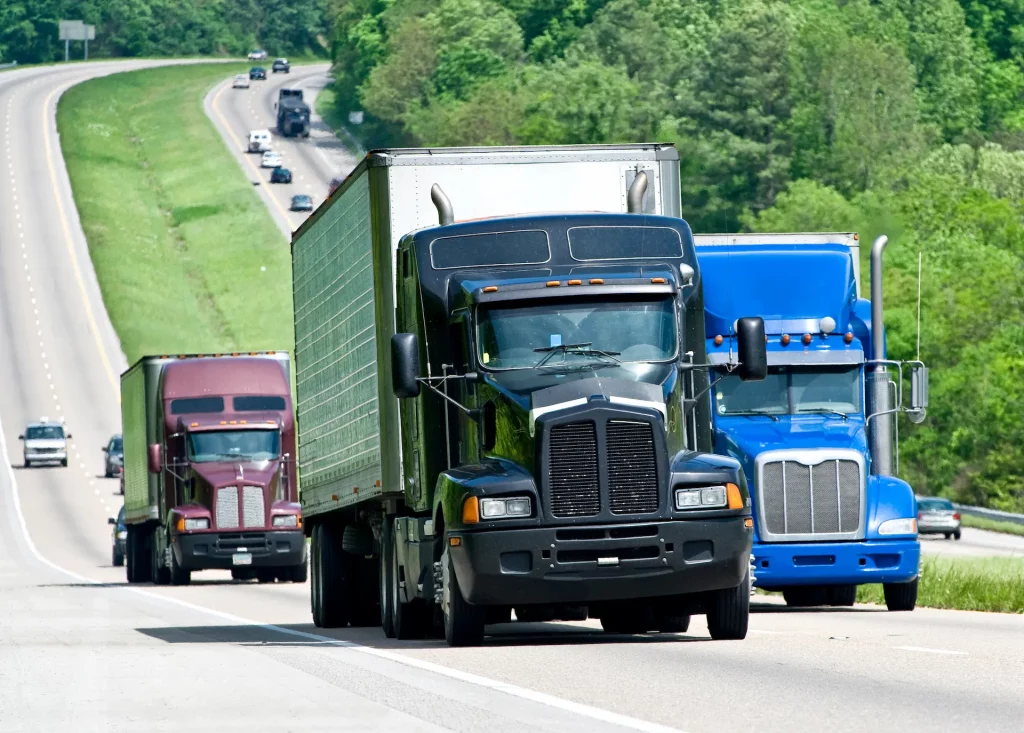Intrastate Trucking Regulations in Texas

Unlike federal interstate trucking regulations, Texas intrastate trucking regulations govern trucking companies and truck drivers who operate solely within Texas. To ensure this essential industry’s smooth and safe operation, Texas has established a comprehensive framework known as “Texas intrastate trucking regulations.”
When trucking companies or drivers fail to adhere to intrastate trucking regulations, they put the rest of us who use the public roadways at risk. Violation of the rules all too often result in truck accidents. When this happens, the trucking company, the truck driver, and other responsible parties should be held accountable for injuries and damages caused by their failure to follow the rules.
These regulations govern many different aspects of the intrastate trucking industry, from licensing and vehicle safety to cargo transportation and environmental compliance. They are designed to promote efficiency, protect public safety, and uphold the integrity of Texas roadways.
What is Intrastate Trucking?
Intrastate trucking refers to truck travel within a single state. Interstate trucking, on the other hand, is when trucks travel across state lines from state to state. In Texas, intrastate truck travel is governed by Texas state law, whereas interstate trucking is overseen by the Federal Motor Carrier Safety Administration (FMCSA). However, even an interstate truck must also abide by Texas intrastate regulations while on the roads in the state of Texas.
The Texas Department of Motor Vehicles (TxDOT) takes a leading role in overseeing and enforcing these intrastate trucking regulations. With its authority granted by state laws, TxDOT collaborates with other state agencies and works with federal authorities to promote truck safety on Texas roads.
What Does the Texas Department of Motor Vehicles (TxDOT) do?
The Texas Department of Motor Vehicles (TxDOT) is a crucial entity responsible for overseeing various aspects of the intrastate trucking industry in the Lone Star State. As the name suggests, TxDOT is primarily concerned with regulating motor vehicles, including commercial trucks that operate within Texas borders.
TxDOT’s role in enforcing Texas intrastate trucking regulations is pivotal in maintaining order and road safety. This agency has the authority to establish rules and regulations that govern the operation of commercial vehicles, and ensure trucking companies and truck drivers comply with those rules. These regulations cover many aspects, including licensing, safety, inspection, and environmental protection, to name a few.
Here are a few of TxDOT’s fundamental responsibilities:
- Overseeing the issuing and renewing of commercial driver’s licenses (CDLs). CDLs are required for truck drivers and is a basic qualification to operate a commercial vehicle.
- Overseeing the distribution of specialized endorsements required for certain cargo types including hazardous materials.
- Regulating permits for oversized or overweight loads, which are necessary when transporting goods that exceed standard weight or size limits.
- Mandating regular safety inspections for commercial vehicles to maintain safety on the roads.
Licensing and Permit Requirements for Intrastate Trucking
Obtaining the proper licenses and permits is essential for complying with Texas intrastate trucking regulations.
A key requirement for commercial truck drivers is the Commercial Driver’s License (CDL). To obtain a CDL in Texas, drivers must pass written and road driving tests that evaluate their knowledge and skills to safely operate a commercial motor vehicle. The CDL comes in different classes, each permitting drivers to operate specific types of commercial vehicles.
In addition to the CDL, certain cargo types require specialized endorsements. One such endorsement is the hazardous materials (hazmat) endorsement. Drivers transporting hazardous materials must pass a background check and undergo additional training and testing to demonstrate their ability to safely handle these dangerous materials.
For trucking companies transporting oversized or overweight loads, special permits are necessary. These permits, issued by the Texas Department of Motor Vehicles, authorize the transportation of loads that exceed standard size or weight limits. Compliance with these permit requirements ensures that transportation of these loads is done with utmost safety for other drivers, the roadways, bridges, tunnels, and more.
Intrastate trucking regulations in Texas mandate regular inspections of commercial vehicles. These inspections help identify any safety issues that could compromise the truck’s safe operation or pose risk to others on the road. The purpose of the mandated inspections is to ensure commercial motor vehicles are in good working condition and properly maintained so they can be safely operated on public roads.
Does Texas Require Intrastate Authority for Commercial Vehicles?
Yes. The Texas Department of Motor Vehicles Motor Carrier Division requires motor carriers operating intrastate commercial vehicles in Texas to register with the department if any of the following apply:
- The motor carrier operates a commercial vehicle or a combination of vehicles with a gross weight, registered weight, or gross weight rating that exceeds 26,000 pounds.
- The motor carrier operates a farm vehicle with a gross weight, registered weight, or gross weight rating that exceeds 48,000 pounds.
- The vehicle transports hazardous materials in an amount requiring placarding.
- The vehicle is designed to transport more than 15 passengers, including the driver.
- The vehicle is a commercial school bus.
- The motor carrier transports household goods for profit, regardless of vehicle weight.
What Are the Intrastate Trucking Regulations in Texas?

Texas imposes specific rules and regulations for trucking companies and truck drivers that operate within state borders. These rules are outlined below:
BASIC DRIVER REQUIREMENTS
To drive a truck defined as a “commercial motor vehicle” in Texas, you must be 18 years old and have a current Texas Commercial Driver’s License (CDL).
HOURS OF SERVICE RULES
Truck drivers operating in Texas can drive a maximum of 12 hours after eight consecutive hours off duty. They may only drive after being on duty for 15 hours once they have eight consecutive hours off duty. A truck driver will be placed out-of-service for eight hours for violating the 12- and 15-hour limits. If drivers have been on duty for more than 70 hours in seven consecutive days, they must take 34 hours off.
ELD REQUIREMENT
Texas law requires intrastate commercial motor carriers and drivers to use electronic logging devices (ELDs) unless exempt. Texas’s ELD rule exemptions are similar to those recognized by the FMCSA. The following are generally not required to use ELDs:
- Truck drivers who operate under short-haul exceptions.
- Truck drivers who use paper records of duty status (RODS) for no more than eight days during a 30-day period.
- Truck drivers performing drive-away-tow-away operations primarily for the delivery of vehicles.
- Truck drivers of vehicles that were manufactured before 2000.
What is the 150-Mile Rule in Texas?
Under the 150-mile rule in Texas, a driver’s record of duty status is not required if the vehicle is operated within a “150 air-mile radius” of the driver’s regular work reporting location if the following apply:
- The driver returns to that location and is released from work within 14 consecutive hours
- The driver has at least eight consecutive hours off duty between every 14 hours on duty
- The trucking company that employs the truck driver maintains business records for six months, including the time the driver reports for duty, the number of hours the driver is on duty each day and the time the driver is released from duty.
What Role Could Intrastate Trucking Regulation Violations Play in a Truck Accident?
A trucking company or truck driver who violates intrastate trucking rules and causes an accident can be found negligent and liable for injuries and damages caused by the crash. To support a claim, documents that need to be obtained include the driver’s hours of service records, driver’s logs, driver qualification file, daily inspection reports, maintenance records and more to determine whether the company and truck driver were in compliance with the regulations.
Proving that a trucking regulation was violated strengthens the liability case against the trucking company and truck driver. An experienced truck accident attorney will work to gather crucial evidence to establish whether the truck company or truck driver violated intrastate trucking regulations and use it to prove liability.
Get Help from Our Texas Truck Accident Lawyers Now
With over 25 years of experience, the truck accident lawyers at The Callahan Law Firm have the knowledge, skill and resources to successfully handle truck accident cases involving violations of intrastate regulations.
We understand that large commercial vehicle accidents can be traumatic and cause life-altering injuries. Compassion for the people we represent is one of the factors that sets us apart from other lawyers and law firms. Every case and client is unique and we strive to give each client the time, attention and care they deserve. At The Callahan Law Firm, our attorneys and legal team want to help you pursue full compensation for what happened, including damages for medical bills, loss of earnings, pain, physical impairment, emotional suffering, and other crash-related losses.
As a boutique law firm focusing on injury litigation, we give our clients the personal, one-on-one attention their cases require. Contact us today for a free initial consultation to learn how we can help, or visit our offices in Houston and Pasadena, Texas.
FAQs
What are the requirements for intrastate trucking in Texas?
In Texas, intrastate trucking has specific requirements that must be met to ensure compliance with state regulations. Some of the key requirements include:
- The truck driver must have a current, valid Commercial Driver’s License (CDL) specific to the class of commercial vehicle being operated.
- Securing specialized endorsements for certain cargo types, such as hazardous materials (hazmat).
- Complying with vehicle safety and maintenance regulations, including regular safety inspections and maintenance record-keeping.
- Adhering to “Hours of Service” (HOS) regulations, which limit the number of hours a commercial driver can operate a vehicle before taking a rest break.
Does Texas require intrastate authority?
Yes, Texas requires trucking companies who operate intrastate – within Texas state borders – to obtain intrastate authority if they wish to operate within the state’s borders. Intrastate authority is the legal permission the Texas Department of Motor Vehicles (TxDOT) grants carriers to operate solely within Texas. What Are The Hours of Service Regulations For Intrastate Trucking in Texas?
Are truck drivers in Texas limited in the number of hours they can drive?
For intrastate trucking in Texas, drivers must adhere to the “Hours of Service” (HOS) regulations, which limit the number of hours they can drive before taking a mandatory rest break.
As of the last update in September 2021, intrastate HOS regulations in Texas were aligned with the federal HOS rules. Under these rules, commercial drivers can drive a maximum of 11 hours after 10 consecutive hours off-duty. However, it’s essential to check with the Texas Department of Motor Vehicles or relevant authorities for any updates or changes to HOS regulations.
Do I need an MC number for intrastate in Texas?
No, an MC (Motor Carrier) number is not required for intrastate operations in Texas. MC numbers are assigned by the Federal Motor Carrier Safety Administration (FMCSA) and are primarily for interstate carriers engaged in transportation across state lines.












